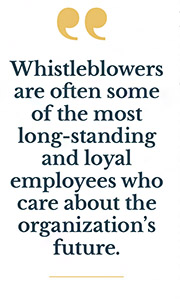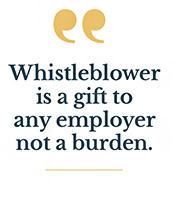You are an employer, and you receive a report that harassment or even criminal activity is taking place in your organization. What will you do? What action will you take?
Although the Slovak Act on the Protection of Whistleblowers of Anti-Social Activity (the “Whistleblowers Act”) sets out obligations only for certain employers, a properly set up internal whistleblowing system is in the interest of every employer. It allows you to deal with anti-social activity internally, which is usually better for all parties involved. Employees need to be assured that their reports are being handled so that they do not turn elsewhere. Employees may disclose breaches externally if the statutory conditions under the Whistleblowers Act are met.
Using a whistleblower hotline is usually the last resort of protection that employees turn to. Prior to using a hotline, employees have usually contacted the HR department or other senior employees to address their issues, albeit unsuccessfully. Whistleblowers are often some of the most long-standing and loyal employees who care about the organization’s future. An ineffective set-up of whistleblowing systems may cause experienced and hard-to-replace employees to leave.
Problems in practice
The Whistleblowers Act sets out certain criteria and procedures for internal whistleblowing systems, but these are not perfect. The legislation is quite brief and does not include detailed explanations of a number of concepts. Complaints of whistleblowers are often processed by HR departments, who do not have the necessary skills and capacity to handle them properly.
 Reporting channels
Reporting channels
The current legislation requires that when establishing a whistleblowing system, employers must ensure that all employees are aware of the basic whistleblowing procedure. Quite often, though, employees are not well informed. At large, multinational employers in particular, employees may report through centralized or group channels that are available to employees in all countries or in a particular group of countries. In practice, however, this is not ideal. Employees do not have confidence in such channels and do not trust that their reports will be handled and addressed. Such channels also tend to be in English and not in the employees’ mother tongue, which many of them also see as a negative.
Person responsible for handling reports
Law specifically stipulates that information about the person responsible for handling reports and the reporting channels must be published and accessible to all employees in a usual and commonly available form. It is often the case, however, that employers have not clearly designated a person responsible in their organization. Employees therefore often do not even know whom to contact. If there is a person responsible, he or she is not sufficiently trained to perform his or her task properly.
Handling reports and taking action
The law leaves employers free to decide how to investigate and handle reports. However, internal rules must regulate all relevant aspects, such as procedures for submission of whistleblower reports, details on the protection of the whistleblower’s confidentiality, the collection of evidence, the provision of feedback about the result of the follow-up process, the measures taken to address breaches found during investigation, and communication with the whistleblower about such measures etc.
 Usually, employers interview the whistleblower and the persons mentioned in the report, and allow them to present evidence. In terms of taking action, the law again does not provide details, but such action should be proportionate to the facts revealed. Employers often move straight to termination, which can be disproportionate, premature, and may lead to avoidable litigation. The Whistleblowers Act also sets time periods within which the employer has to take action. We have encountered cases where employers have taken almost twice as long to act or even a couple of months.
Usually, employers interview the whistleblower and the persons mentioned in the report, and allow them to present evidence. In terms of taking action, the law again does not provide details, but such action should be proportionate to the facts revealed. Employers often move straight to termination, which can be disproportionate, premature, and may lead to avoidable litigation. The Whistleblowers Act also sets time periods within which the employer has to take action. We have encountered cases where employers have taken almost twice as long to act or even a couple of months.
The true cost of ESG
As part of their ESG programs, employers are increasingly addressing issues such as transparency and ethics, including whistleblowing. The risk of social media reporting on whistleblower cases impacting reputation is an additional factor that businesses must take into account. HR departments should focus more on educating managers and encouraging certain behaviors in the workplace.
In-house counsel or external lawyer?
Employees may be afraid to speak openly about anti-social activities to in-house counsel or employees investigating a report, for fear of losing their jobs. It is almost impossible in such a situation to investigate properly and take appropriate action. Lawyers, as outsiders, are often able to gain the trust of employees and collect the information needed to recommend appropriate action. Retaining the services of external lawyers instead of in-house counsel is a smart choice not only because of their professionalism and expertise, but also their duty of confidentiality. It ensures absolutely confidential handling of sensitive information regarding both the employer and the employee.
Conclusion
A properly set up whistleblowing system contributes to an organization’s ESG commitments relevant to retaining talent, maintaining reputation, and cultivating employee loyalty. A well-configured system enhances the company culture, keeps high-performing employees in the organization, lightens the load on the HR department, and ultimately helps employers uncover serious problems and hidden issues in their organizations. Whistleblowing is a gift to any employer, not an administrative burden.
Soňa Hanková, Partner, CMS Slovakia, law firm
Ján Ševčík, Junior Associate, CMS Slovakia, law firm




Follow us